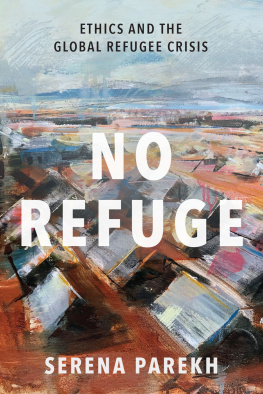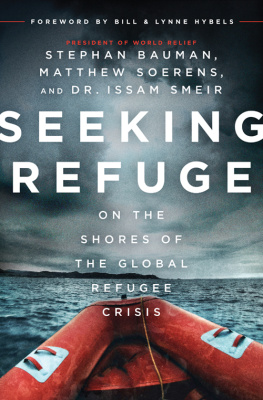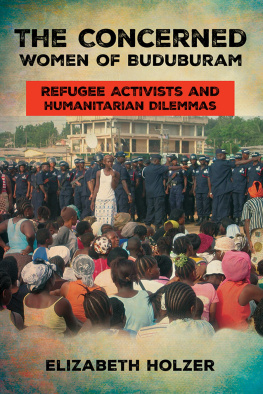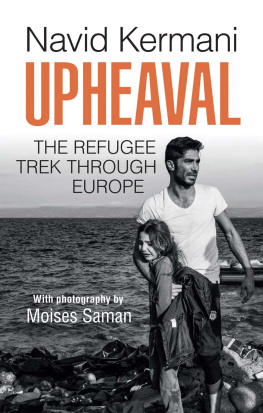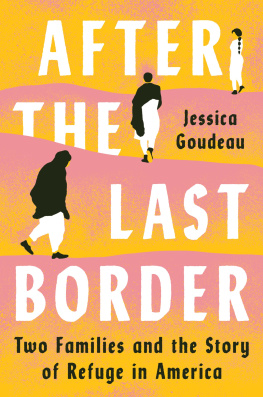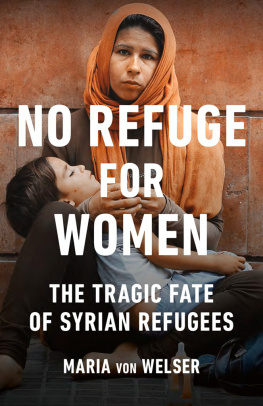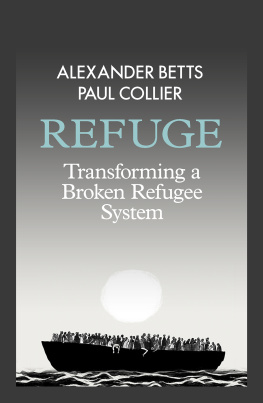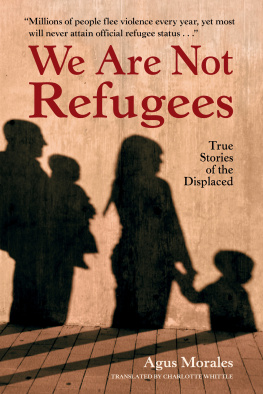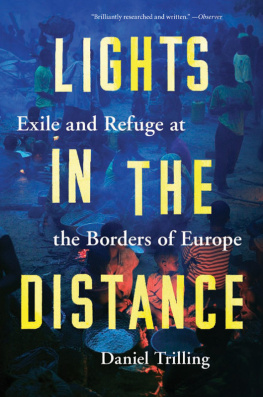NO REFUGE

Oxford University Press is a department of the University of Oxford. It furthers the Universitys objective of excellence in research, scholarship, and education by publishing worldwide. Oxford is a registered trade mark of Oxford University Press in the UK and certain other countries.
Published in the United States of America by Oxford University Press
198 Madison Avenue, New York, NY 10016, United States of America.
Oxford University Press 2020
All rights reserved. No part of this publication may be reproduced, stored in a retrieval system, or transmitted, in any form or by any means, without the prior permission in writing of Oxford University Press, or as expressly permitted by law, by license, or under terms agreed with the appropriate reproduction rights organization. Inquiries concerning reproduction outside the scope of the above should be sent to the Rights Department, Oxford University Press, at the address above.
You must not circulate this work in any other form and you must impose this same condition on any acquirer.
Library of Congress Cataloging-in-Publication Data
Names: Parekh, Serena, 1974 author.
Title: No refuge : ethics and the global refugee crisis / Serena Parekh.
Description: New York, NY : Oxford University Press, [2020] |
Includes bibliographic references.
Identifiers: LCCN 2020003047 (print) | LCCN 2020003048 (ebook) |
ISBN 9780197507995 (hardback) | ISBN 9780197508015 (epub) |
ISBN 9780197508022
Subjects: LCSH: RefugeesEuropeSocial conditions. |
Humanitarian assistanceMoral and ethical aspects. |
RefugeesPublic opinion. | RefugeesGovernment policyEurope. |
EuropeEmigration and immigrationGovernment policy.
Classification: LCC HV640 .P366 2020 (print) | LCC HV640 (ebook) |
DDC 174/.936287dc23
LC record available at https://lccn.loc.gov/2020003047
LC ebook record available at https://lccn.loc.gov/2020003048
For my father and in loving memory of my mother
If you look at the statistics, you get depressed, but if you look at the people, you find hope.
Filmmaker working in the Democratic Republic of the Congo, quoted in Milliband, Rescue, p. 67
Contents
Part I
The First Crisis: The Crisis for Western Countries
Part II
The Second Crisis: The Crisis for Refugees
I used to have a terrible fear of flying. It all went back to an episode of turbulence so awful that I couldnt put it out of my mind. The plane dipped and dived seemingly out of control, leaving me nauseous, dizzy, and scared. After that, I avoided flying as much as I could, and if I had to get on a plane, I spent the entire flight terrified.
Because its almost impossible to avoid flying these days, I eventually had to find some way of coping. My local adult education center advertised a fear of flying course taught by a pilot, and I signed myself up. The instructor calmly explained the mechanics of flying, how difficult it was, in fact, for a plane to crash, and all the various safety measures airlines put in place. But he never actually addressed the thing that had brought me in: turbulence. When he came to the end of his lecture, I raised my hand and asked him about this, the thing that was so crucial to my fear of flying.
According to the instructor, turbulence was such a nonissue that he tended to forget to mention it. A plane in turbulence was just going with the flow, so to speak, following the natural air current. The pilot could easily correct for this and it posed no threat to the safety of the plane. There was nothing to be afraid of at all.
How could it be that the source of my fear of flying, the thing that had cast a shadow over every travel experience and caused me so much anxiety, was objectively not dangerous? Yet the pilot was unequivocal: there was nothing to fear from turbulence.
It took a while for my body to catch up to my brain. Getting on a plane, my anxieties still made themselves known, and I had to calm them by reminding myself of what I had learned. But eventually I stopped being afraid of flying.
When I speak about the treatment of refugees I feel as though it is my turn to play the role of the pilot defusing baseless fears. In the winter of 2017, the refugee travel ban had just been put in place in the United States, and my book Refugees and the Ethics of Forced Displacement had just come out. I gave lectures about why we should accept refugees for resettlement in the United States and why, in my opinion, we should be doing more to help refugees around the world. Once my talk was over, an audience member would invariably ask: but arent refugees dangerous? In other words, it may be that we should help people, but given that at least some refugees enter our countries with the intention to hurt or kill us, shouldnt we protect ourselves? It was perfectly obvious to me that refugees in the United States had absolutely no connection to terrorism. The data are very clear that there is no correlation in the United States between refugees who are resettled and terrorism. Though the issue of security is the question that may have brought people to my talk, I never mentioned it. I was just like the pilot who had forgotten to discuss turbulence.
By 2017, fear of refugees was widespread. It had colored many peoples views of the roles we should play in helping refugees. Not only did I need to address this fear, but I couldnt talk about anything else regarding refugees until I addressed it.
Peoples views of refugees around the world have shifted since 2017. Though refugees are still feared by some, the nature of the fear has changed. Refugees are depicted less frequently as terrorists, and more as criminals and sexual predators. Others now also worry about the economic cost of dealing with large numbers of asylum seekers who have sought refuge in the West in recent years. So before I go on to talk about how we should understand our moral obligations to refugees, let me first get turbulence out of the way by addressing some of the big worries people have about refugees.
Are Refugees Terrorists?
One of the biggest concerns with refugees, especially in the United States, is that they are terrorists in disguise. The most common claim is that a would-be terrorist might be able to use the refugee resettlement program to sneak into the United States to commit terrorism. Several Republican presidential candidates put forward this idea during debates ahead of the 2016 election. While every Republican candidate promised to close the border to refugees, some went further. So dangerous are refugees, claimed New Jersey governor Chris Christie, that we shouldnt even let in orphans under five years of age. Politicians across Europe have adopted a similar position. Hungarian Prime Minister Viktor Orbn claimed that refugees were the Trojan Horse of terrorism.
This reaction was due in part to the terrorist attack in Paris in November 2015. One of the terrorists involved in this attack reportedly carried a Syrian passport, sparking fears that terrorists had come to Europe posing as refugees along with the hundreds of thousands of other refugees who arrived in Italy and Greece that year. Lax border control and overly generous refugee policies received the lions share of the blame for the attack. News reports eventually emerged to reveal that the passport itself was forged and that the majority of the attackers were French or Belgian nationals, but it was too late. The

